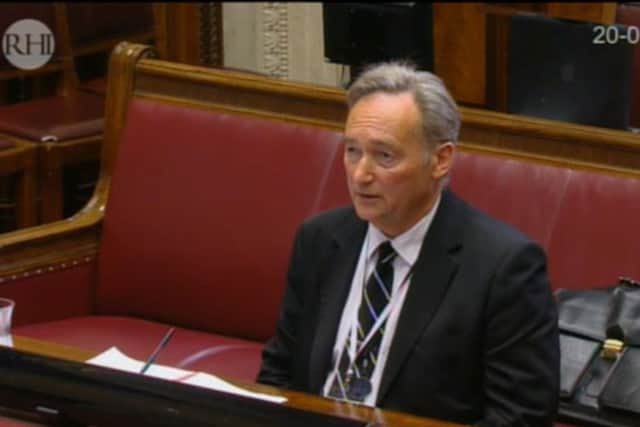'˜Info on RHI was being leaked to people who would benefit'
and live on Freeview channel 276
John Mills, who was the director of the energy division within the Department of Enterprise, Trade and Investment (DETI), said that over the final months of the scheme there was a problem with sensitive information leaking to those who were then able to use that knowledge to commercially benefit from the subsidy.
The veteran civil servant, who was two rungs from the top of the department, said that throughout the final months of the scheme “advance knowledge becoming swiftly available to outside interests continued to be a feature of policy development on the RHI, until its closure”.
Advertisement
Hide AdAdvertisement
Hide AdHe said that a similar problem was evident in the renewable electricity subsidy programme where commercially significant changes were also being made in that period.


In a written statement to the public inquiry into the cash for ash scandal, Mr Mills recalled the time when the scheme was being finally closed in early 2016 after the belated introduction of cost controls in November 2015 had not been enough to rein in spending and it had been clarified that the entire overspend would come from Stormont’s budget rather than from the Treasury.
He referred to “stakeholder contact which appeared to be well informed of governing policy developments before they had been announced. This probably reached a nadir in around February 2016 when stakeholders appeared to have greater knowledge than officials”.
When asked at the inquiry yesterday who he believed was responsible for the premature release of information, the senior civil servant said that he initially assumed it was DUP special advisers (Spads).
Advertisement
Hide AdAdvertisement
Hide Ad“At the time I assumed that the mostly likely explanation was that details had been relayed through Spads,” he said.
However, he added that “DETI had issued public documents that would have alerted stakeholders that something was happening in October 2015” and that “indiscreet engagement with the industry by officials has also been highlighted by the inquiry”.
Civil servants were aware that there would be a spike in applications once they came to make the subsidy less lucrative but say that they had no expectation of the scale of the surge in people piling into the green energy subsidy amid multiple delays to the ending of the uncapped ‘burn to earn’ tariff. Ultimately, almost 1,000 boilers joined the scheme in the final three months before cost controls – double the entire applications during almost three years of the scheme up to that point.
Yesterday Dr Keith MacLean, the inquiry panel’s technical assessor, asked Mr Mills whether one way to avoid a spike in applications “would be to just not tell them [potential applicants] what’s going on and to be very, very careful about what information was being provided to the industry to avoid that from happening”.
Advertisement
Hide AdAdvertisement
Hide AdMr Mills agreed with that proposition but said that it was not an idea which he recalled ever passing on to the civil servants beneath him. However, he said that creating government policy would inevitably involve contact with those who stood to gain or lose from a proposal.
He said that there was “some naiveté around the extent of officials’ contact with the industry” but that there was a “fine line” between forewarning industry in a way which disadvantaged the public and in not engaging at all with stakeholders, potentially heightening the chance of a legal challenge to the change.
Mr Mills said that he could have asked other government bodies to stop promoting the scheme and that with hindsight “it may have been reasonable” to have stressed the need for confidentiality.
At one point in his evidence, he said: “I don’t think it’s particularly possible for me to defend a lot of decisions that were taken in this or any other period on RHI”.